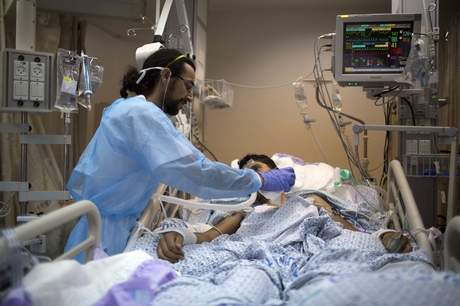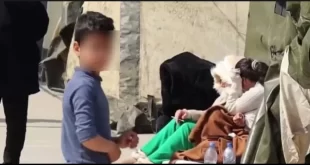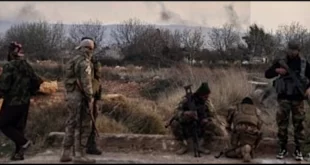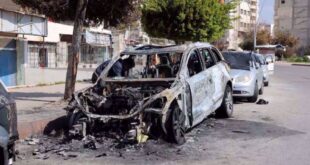
Feb 12, 2014, the National
When a rebel was shot and severely wounded during a new offensive on Syria’s southern front, his colleagues knew the only hope of saving his life was to get him to Israel.
The rebels called their contact on the Syrian side of the frontier, a man known as Abu Nidal, who had a phone given to him by the Israelis to facilitate emergency border crossings.
Abu Nidal called Israeli forces, which put an ambulance on standby and the rebels took the injured fighter to a crossing point and left him there.
After the rebels pulled back, Israeli soldiers checked the patient for booby-traps and weapons, and then whisked him over the border and rushed him to hospital.
This scenario from last week has played out more than 200 times in the past six months, rebels in southern Syria said.
Wounded civilians and fighters have been ferried across one of the world’s most bitterly disputed frontiers, as Syrians seek expert medical treatment from a country they once viewed as the enemy.
Syria and Israel have officially been at war since 1948, and Syrians have grown up with state propaganda blaming the country’s problems on Israel and its main ally, the United States.
With the uprising-turned-war against the president, Bashar Al Assad, however, rebels engaged in combat near Israel have begun to reassess who is friend and who is foe.
And Israel also has to be wary of rebel factions linked to Al Qaeda taking control of the Syria-side of its frontier, something it is at pains to avoid fearing it would then be attacked. Earning some goodwill among local Syrians through provision of medical care may pay dividends in keeping Al Qaeda groups away.
Transporting wounded across the border is, from the rebel point of view, fairly easy. They call Abu Nidal, take the wounded to the border and leave. The Israelis do the rest.
“More than 250 of our people have gone across, they get amazing medical care there,” said a rebel commander in Deraa, where a new offensive known as Geneva Horan is under way.
“We’ve had wounded people taken across and get airlifted to specialist facilities far inside Israel, we couldn’t dream of getting that kind of treatment here, our field hospitals don’t even have proper doctors or pain killers.”
According to Israeli media, 700 civilians, including the elderly and children, have been treated for war injuries in a field hospital set up a year ago in the Golan Heights, territory Israel annexed from Syria in 1981 after seizing it during the 1967 war, a move not recognised by the international community.
Getting wounded men into Israel for treatment is sometimes more straightforward than transporting them into Jordan, where rebels say the authorities have a more lengthy screening process that the severely injured can ill afford to wait out.
Rebel commanders recount cases in which wounded fighters were turned back from the Jordan border, the closest exit at the time, and taken to Israel instead. Some have died en route having been rejected by Amman, rebels said.
Those taken for treatment in Israel are not harshly treated and are only questioned if they agree to talk to Israeli security officers, according to rebels in southern Syria. Those who refuse to speak are given medical care and allowed to recuperate alongside those who opt to share information.
“The Israelis are mainly interested in the Islamists, they want to know their numbers and locations and even the most trivial details about them,” said another rebel commander who has sent wounded fighters over the frontier.
“They also want to know what kind of weapons the rebels have, what quantities, what capabilities.”
In Deraa the more extreme rebel fringe has limited presence compared to other parts of the country, but Jabhat Al Nusra, an Al Qaeda affiliate, remains a significant force and the Islamic Muthanna Movement, ideologically close to more radical groups, is also powerful.
Both groups knew about rebels seeking medical aid in Israel, and turned a blind eye to it, rebel commanders said.
“It’s not a secret and they [Al Nusra and the Muthanna Movement] know that if the wounded don’t get help in Israel they will die, so they look the other way and wounded fighters get a chance to live,” said a rebel commander.
Syrians from Deraa, the birthplace of the uprising and an area that has long been garrisoned by regime troops because of its proximity to Israel, have been appreciative of the medical assistance.
“Any help we can get we appreciate and in my opinion if the Israel air force want come and bomb some of Assad’s bases here, they’d be very welcome,” said a Deraa resident.
When they are discharged and returned across the border, rebels say the recovered patients are given between US$200 (Dh735) and $1,000 in cash and supplies of whatever medicines they need for their recovery. Many rebels in Deraa have been fighting without pay for months.
Israel has been discreet about its provision of the medical care, although it allowed TV cameras into a field hospital last month for the first time.
Its medical aid for the opposition fighters has prompted speculation that even greater help is going to Syrian rebels, including suggestions of intelligence sharing on regime forces and even arms supplies.
It remains a highly sensitive issue and the identities of Syrians being treated in Israel are kept secret, out of fear of mistrust from their friends and retribution, either from Islamic extremists or the regime.
Israel’s policy towards the revolt appears to have been as confused as western policy. The conflict, which has killed more than 136,000 people, has prompted worries about the growing role of Al Qaeda, Iran and Hizbollah.
Israel is widely reported to have carried out missile strikes to prevent weapons transfers from the Syrian regime to Hizbollah, but they have been limited.
The wounded fighter stretchered across the border on February 2, just a day into the Geneva Horan offensive, received medical treatment but died. His corpse was returned to Syria, cleaned and with a note of condolence attached, written in Arabic, together with a thorough medical report detailing cause of death.
An opposition activist from Deraa was quick to contrast that with the treatment of Syrian wounded in regime administered hospitals, where human-rights groups and the UN have documented the injured being arrested, refused treatment and tortured by government security agents.
“Wounded Syrians go to Israeli hospitals and their lives are usually saved but if they go to a Syrian [regime] hospital, they are more likely to be killed,” the activist said.
 Syria Support Movement solidarity with the Syrian people
Syria Support Movement solidarity with the Syrian people




